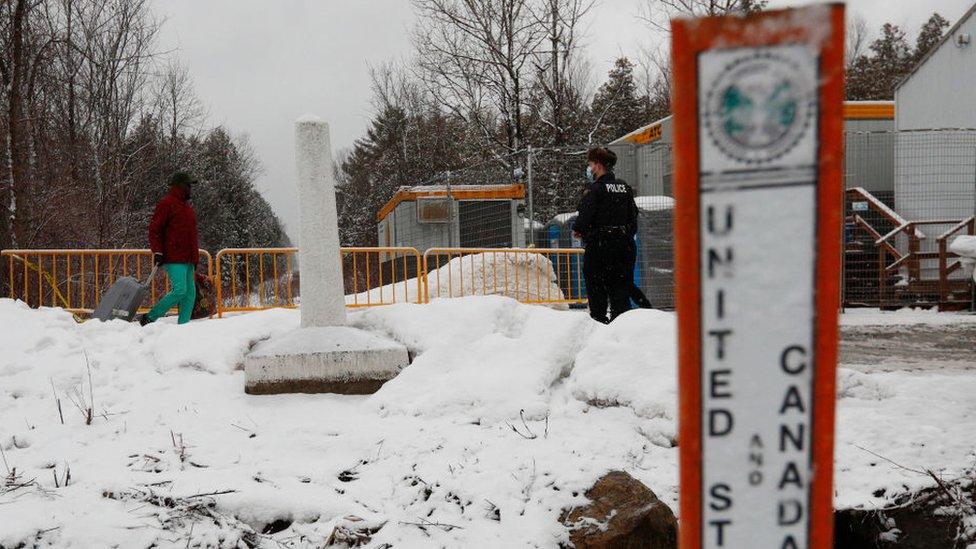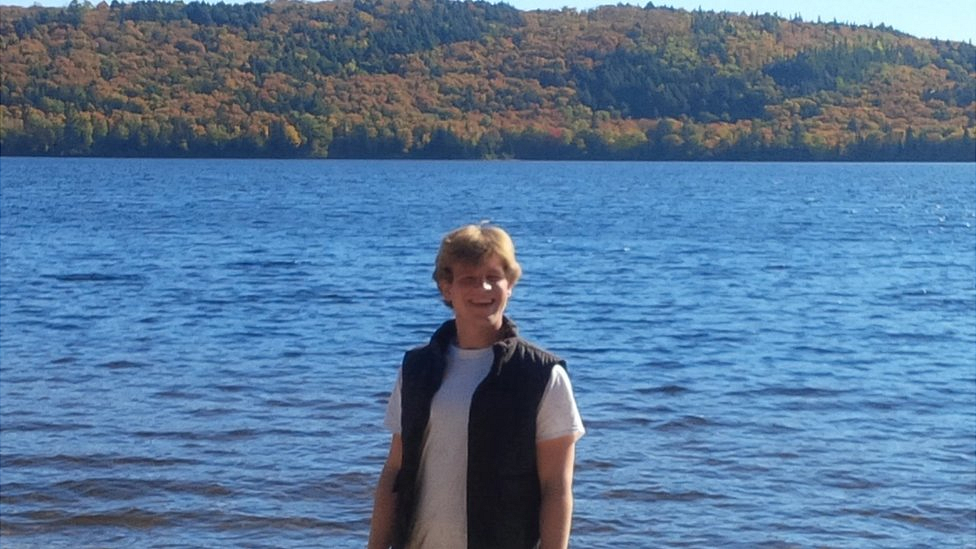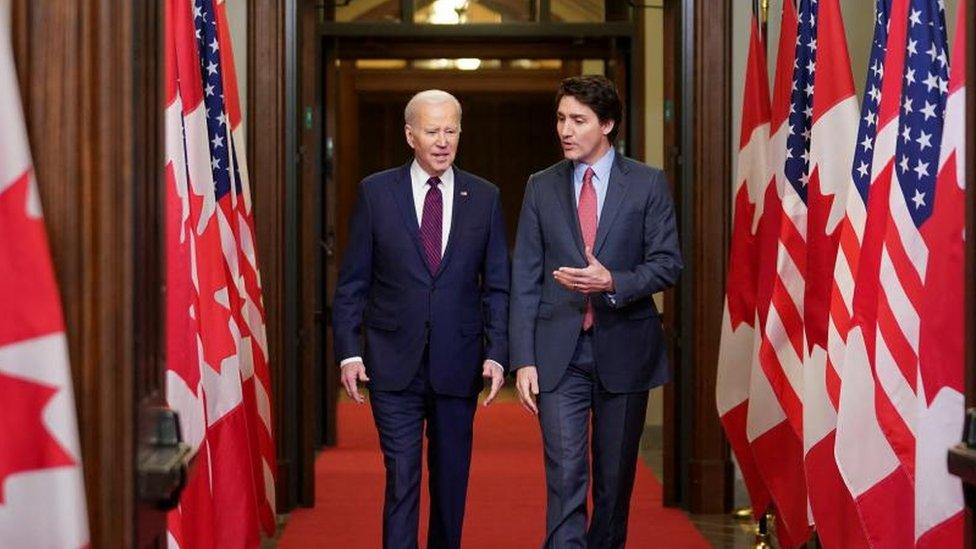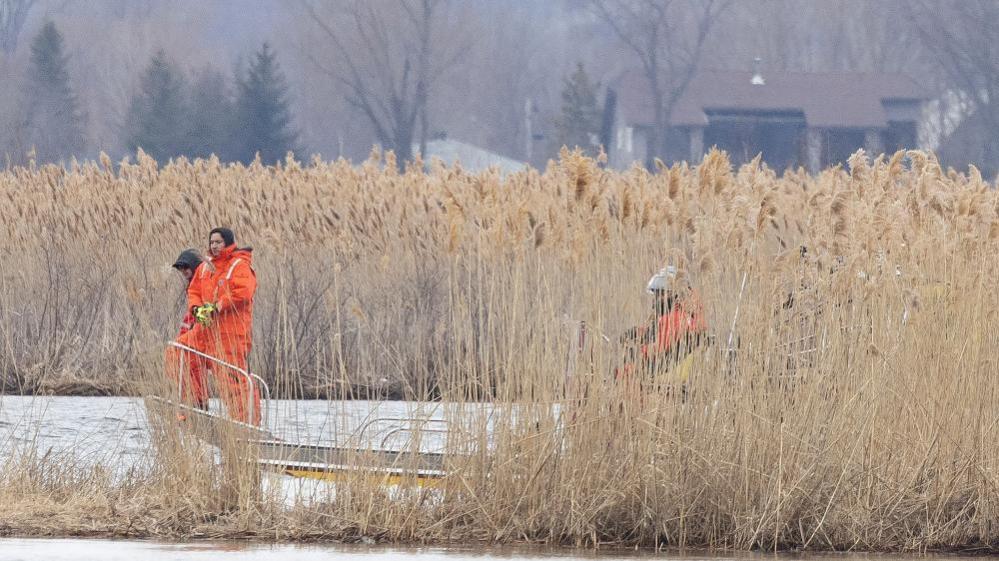Vivek Ramaswamy idea for US-Canada border wall labelled 'extreme'
- Published

Vivek Ramaswamy has repeatedly called for 'two walls' at the US northern and southern borders
Since Donald Trump's presidency, the construction of an impenetrable wall at the US-Mexico border has become a common refrain among conservative politicians.
But one Republican presidential hopeful, Vivek Ramaswamy, wants to take the idea even further. His proposal: A wall along the 5,500 mile long (8,900km) US-Canada frontier.
At Wednesday's primary debate in Miami, the 38-year-old candidate argued that enough fentanyl crossed the border last year to "kill three million Americans".
His calls to tackle the trade by building a colossal border wall were quickly panned by experts.
On stage at the presidential debate, Mr Ramaswamy claimed that the US should "build both walls" to stop the flow of drugs into the US.
His claim follows an earlier visit to the Roxham Road crossing in Quebec, where he claimed the heavily forested border is "wide open for invasion" and easily crossed by traffickers and illegal migrants.
But statistics show that the scale of fentanyl trafficking along the US-Canada border - the world's longest - pales in comparison to the US-Mexico border.
Watch: Vivek Ramaswamy: Five things to know about the biotech multi-millionaire
According to data from US Customs and Border Patrol (CBP), just under two and a half pounds - about a kilogram - of fentanyl was seized at the Canadian border in the 2023 fiscal year.
The figure represents well under 1% of the 26,718 lbs (12,119kg) of fentanyl seized at the southern border during the same timeframe.
The previous fiscal year, the figures stood at 14lbs (6.3kg) along the Canadian border, compared to 14,104 lbs (6,397kg) along the US-Mexican border.
Additionally, the statistics show that about 189,400 migrant "encounters" were reported at the US-Canada border in the 2023 fiscal year, compared to 2.47 million along the border with Mexico. The previous year, only 2.7% of migrants apprehended at the same border were taken into custody between ports of entry.
"You can't compare the borders... when he said that yesterday, I kind of laughed," Dr Frederick Gagnon, an expert on US-Canada relations at the University of Québec in Montreal, told the BBC. "What he proposes seems very extreme."
While Mr Ramaswamy's proposal quickly caught the eye of Canadian journalists and political commentators, he is not the first US politician to float the idea.
In 2015, for example, then-Wisconsin Governor Scott Walker similarly suggested that a US-Canada border wall was "a legitimate issue for us to look at".
The response to his comments was both swift and furious, drawing intense ridicule from his Republican opponents. One of them, Kentucky Republican Rand Paul, described it as a "pretty dumb idea" and a "ridiculous notion".
Even Donald Trump, for whom border security was and remains a key policy platform, dismissed the idea, telling Telemundo in an interview that the US-Canada border is a "massively long piece" and "not our big problem".
Aaron Ettinger, a professor of US and Canadian foreign policy at Carleton University in Ottawa, said that Mr Ramaswamy's comments should be taken in the context of the campaign and could be an effort to "localise" border issues for voters far from the US-Mexico border.
"From a politicking perspective, it might be a good way to draw in right-wing voters in upstate New York, Vermont, in the northeast or in rural states across the prairies," he said. "It might be an effective way of showing that this guy is interested in 'our' border, which is kind of the 'other' border."

The US-Canada boundary is the longest international border in the world
"There might be some electoral method to the madness," Mr Ettinger added. "But to anybody who knows anything about the policies, it's ludicrous."
The BBC has reached out to Global Affairs Canada and the Ramaswamy campaign for comment.
Even if the US were to move to further secure its northern border, it would face enormous financial and logistical challenges to do so. The lengthy boundary between the countries includes 146 ports of entry, as well as vast expanses of forests, plains, lakes and mountainous terrain.
Jason Kenney, a former Alberta Premier and MP who also served as Minister for Citizenship, Immigration and Multiculturalism and later Minister of Defence, said that he sees Mr Ramaswamy's proposal as "completely nuts".
"Building such a wall is completely, obviously unfeasible," he told the BBC in a statement. "Doing so would likely take decades and cost at least hundreds of billions of dollars."
"I have never heard a single American national security official or expert suggest a northern border wall, because they all know that it would be a catastrophic waste of resources without a significant improvement in border security," he added.
In contrast to Mr Ramaswamy's comments, Mr Kenney said that "all evidence indicates" that Canada's security interests are "greater" than the United States' at the shared border.
In the 2022-2023 fiscal year, Canadian officials also seized about 8 lbs (3.6kg) of fentanyl across the country's 1,200 ports of entry, according to the Canadian Border Service Agency.
While police gun tracing data in the country is incomplete, Canada's national statistical agency has also suggested that over a quarter of weapons used in homicides were purchased across the border in the US.
"If anything, Canada should be pressing the US government to secure its southern border as part of our shared interests," Mr Kenney said, adding that "more illegal and irregular migrants cross the border from the United States than the inverse".
"I suspect Mr Ramaswamy knows perfectly well that his proposal is a complete non-starter," he added. "But it is part of his effort to be as ridiculously provocative as possible."
Related topics
- Published17 September 2023

- Published25 March 2023

- Published1 April 2023
